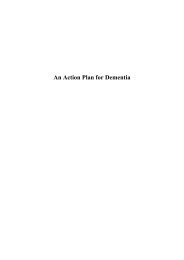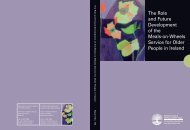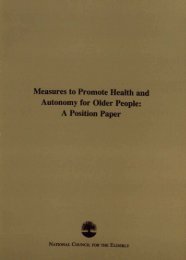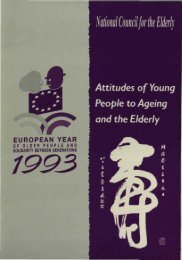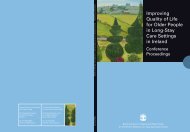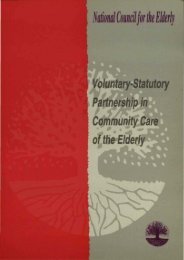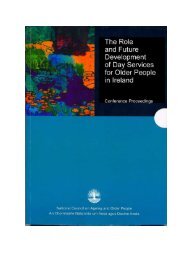From Ageism to Age Equality: Addressing the Challenges ...
From Ageism to Age Equality: Addressing the Challenges ...
From Ageism to Age Equality: Addressing the Challenges ...
You also want an ePaper? Increase the reach of your titles
YUMPU automatically turns print PDFs into web optimized ePapers that Google loves.
problem. Hence <strong>the</strong> public awareness campaign, Say No <strong>to</strong> <strong><strong>Age</strong>ism</strong>, which <strong>the</strong> partners supporting itsee very much as only a first step. Awareness of ageism must begin among policy-makers and thosewho manage services of critical importance <strong>to</strong> <strong>the</strong> welfare of older people, including <strong>the</strong> health andsocial services. We must look <strong>to</strong> <strong>the</strong>m <strong>to</strong> develop and implement strategies <strong>to</strong> combat ageism in <strong>the</strong>irsec<strong>to</strong>rs.The organisers of this seminar count <strong>the</strong>mselves most fortunate that Craig Muir from <strong>the</strong> UKDepartment of Health was able <strong>to</strong> brief us on Standard One of <strong>the</strong> NSF for Older People, Rooting Out<strong>Age</strong> Discrimination. We have much <strong>to</strong> learn from this strategy, not least that it demonstrates arecognition of <strong>the</strong> problem and a vision and determination at departmental and senior healthservices management level <strong>to</strong> ensure that older people are never unfairly discriminated against inaccessing NHS or social care services because of <strong>the</strong>ir age. This must also happen in this country.Acknowledging ageism and age discrimination in health and social care services is one thing; doingsomething about <strong>the</strong>m is ano<strong>the</strong>r. Here, <strong>to</strong>o, we are fortunate <strong>to</strong> be able <strong>to</strong> learn from <strong>the</strong>experience of auditing age discrimination and tackling it at management and grassroots levels inEngland, as described by Ros Levenson. The King’s Fund guide and <strong>the</strong> Toolkit for Older People’sChampions will undoubtedly be important leads for us <strong>to</strong> follow in our efforts <strong>to</strong> address ageism ingeneral and age discrimination in particular in our health and social care services.Developing <strong>the</strong> <strong>Age</strong> <strong>Equality</strong> <strong>Age</strong>ndaRichard Baker from <strong>the</strong> organisation AGE gave us a European perspective. He briefed us on Europeandevelopments relating <strong>to</strong> discrimination, from Article 13 of <strong>the</strong> 1997 Amsterdam Treaty <strong>to</strong> <strong>to</strong>day via<strong>the</strong> 2000 framework Directive on equal treatment in employment and occupation and this year’s slimGreen Paper on <strong>Equality</strong> and Non-Discrimination in an Enlarged European Union.71We look forward <strong>to</strong> AGE’s December 2004 report which will look at evidence of age discriminationbeyond employment. We also note <strong>the</strong> importance of last week’s European Council decision <strong>to</strong> lookat universal access, and fairness and solidarity in healthcare as part of <strong>the</strong> open method ofcoordination in <strong>the</strong> field of health and long-term care.Niall Crowley of The <strong>Equality</strong> Authority gave us a comprehensive briefing on <strong>the</strong> current status ofrecommendations made in Implementing <strong>Equality</strong> for Older People. While it is clear that someprogress has been made, particularly on <strong>the</strong> legislative front, much remains <strong>to</strong> be done in addressingupper age limits where <strong>the</strong>re is no justification for <strong>the</strong>m, and in implementing <strong>the</strong> recommendationsmade on policy-making (10), working (13), income (6) health and community services (18), andlifelong learning (12). Some of <strong>the</strong>se reiterate recommendations long called for by <strong>the</strong> Council ando<strong>the</strong>r agencies. Some <strong>to</strong>uch directly on matters of age awareness training, equality of opportunityand equality of access. While we should seek <strong>to</strong> ensure that all of <strong>the</strong>se recommendations areimplemented, in <strong>the</strong> context of this conference we must particularly emphasise thoserecommendations relating <strong>to</strong> age discrimination, age abuse, access <strong>to</strong> core community care servicesand access <strong>to</strong> long-stay residential services for those who need <strong>the</strong>m, and, most importantly, qualityof services for <strong>the</strong> frail and chronically ill.<strong>From</strong> <strong><strong>Age</strong>ism</strong> <strong>to</strong> <strong>Age</strong> <strong>Equality</strong>: <strong>Addressing</strong> <strong>the</strong> <strong>Challenges</strong>





